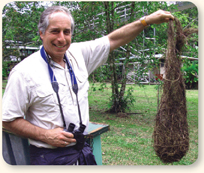Dear Student:
Welcome to our world—the endlessly fascinating world of biology.
I can guess what some of you are thinking right now. “Fascinating? Yeah, right. Totally.” Well, give us—and biology—a chance to show you that the study of the natural world really is more exciting, more fascinating, and more important to you personally than you've ever realized. In fact, biology is more important to our daily lives today than it has ever been.
Why? Three words: ”We are one.” This isn't meant in a ”touchy-feely” or ”New Age” way. “We” includes all forms of life on Earth. And “are one” means that all of us are tied together more tightly, in more different ways, than anyone imagined until recently.
Both our “hardware” (body structures) and our “software” (genetic instructions and
biochemical processes that program body functions) are incredibly similar to those of all other living things. Genetic instructions in our bodies are written in the same universal code as instructions in bacteria and palm trees. As biologists “read” and study that code, they find astonishingly similar processes in all of us. That's why medical researchers can learn about human diseases that may strike you or your family by studying not only apes and pigs and mice, but even yeasts. We are one on the molecular level.
All organisms interact with one another and with the environment to weave our planet's web of life. Organisms make rain forests and coral reefs, prairies and swamps—and farms and cities. We interact, too, with the winds and ocean currents that tie our planet together. Human activity is changing local and global environments in ways that we still don't
understand … and that affect our ability to produce food and protect ourselves from
diseases. We are one ecologically with the rest of life on Earth.
All organisms evolve over time, adapting to their surroundings. If humans alter the
environment, other organisms respond to that change. When we use antibiotics against
bacteria, they develop resistance to our drugs. If we use pesticides against insects, they become immune to our poisons. We are one in our ability to evolve over time.
Those are the kinds of connections you will find in this book. Microscopic.
Enormous. Amusing. Threatening. But always fascinating. That's why—no
matter where you start off in your
attitude about biology—we think you
are in for some surprises!
Sincerely,


Table of Contents
- Formulas and Equations
- Applying Formulas and Equations
- Mean, Median, and Mode
- Estimation
- Using Measurements in Calculations
- Effects of Measurement Errors
- Accuracy
- Precision
- Comparing Accuracy and Precision
- Significant Figures
- Calculating With Significant Figures
- Scientific Notation
- Calculating With Scientific Notation
- Dimensional Analysis
- Applying Dimensional Analysis




